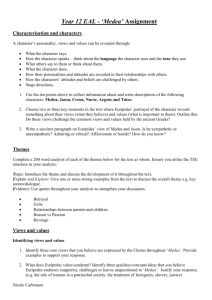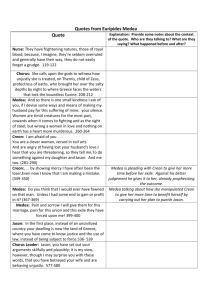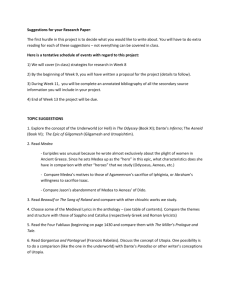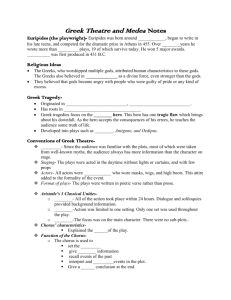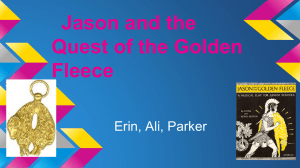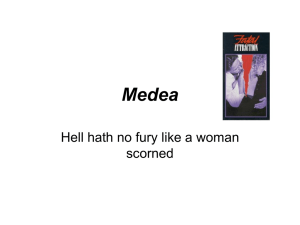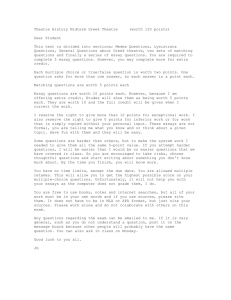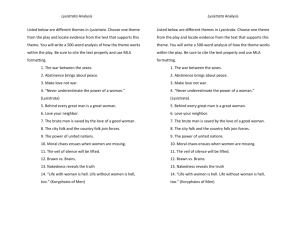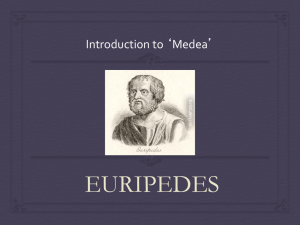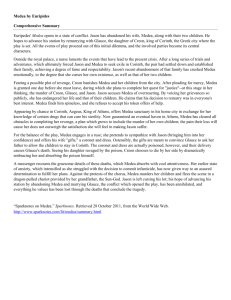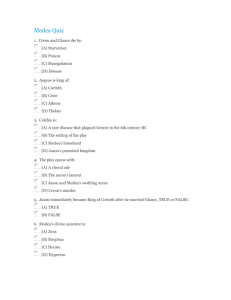Ginger, Nani Stephanie & Gerson FINAL revision
advertisement
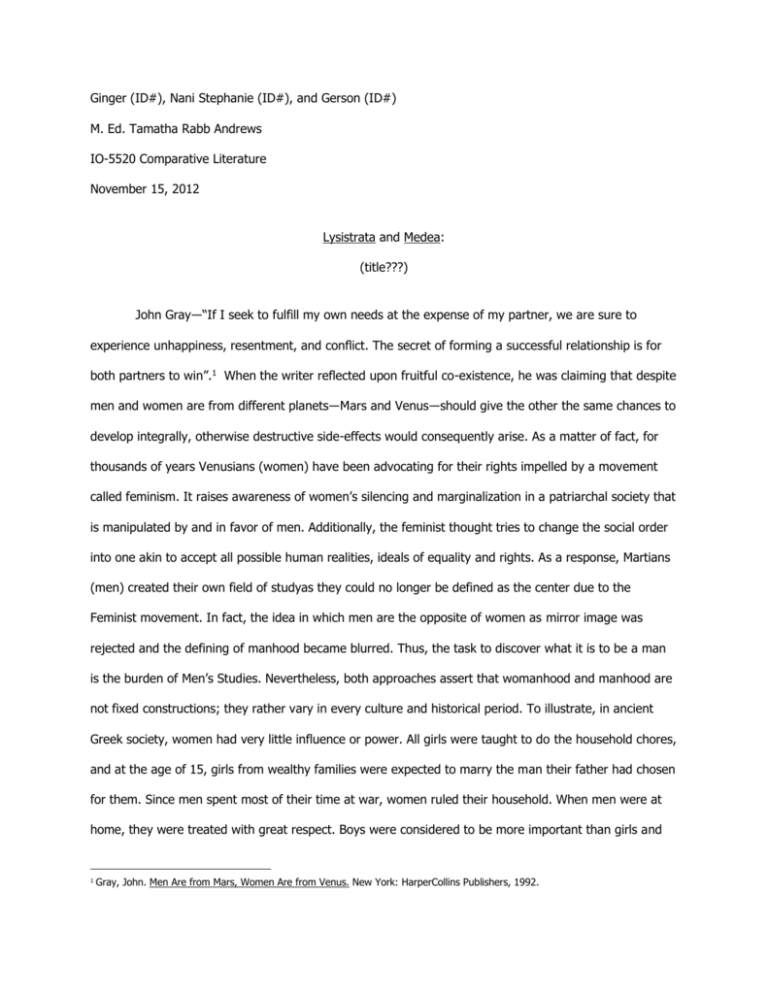
Ginger (ID#), Nani Stephanie (ID#), and Gerson (ID#) M. Ed. Tamatha Rabb Andrews IO-5520 Comparative Literature November 15, 2012 Lysistrata and Medea: (title???) John Gray―“If I seek to fulfill my own needs at the expense of my partner, we are sure to experience unhappiness, resentment, and conflict. The secret of forming a successful relationship is for both partners to win”.1 When the writer reflected upon fruitful co-existence, he was claiming that despite men and women are from different planets―Mars and Venus―should give the other the same chances to develop integrally, otherwise destructive side-effects would consequently arise. As a matter of fact, for thousands of years Venusians (women) have been advocating for their rights impelled by a movement called feminism. It raises awareness of women’s silencing and marginalization in a patriarchal society that is manipulated by and in favor of men. Additionally, the feminist thought tries to change the social order into one akin to accept all possible human realities, ideals of equality and rights. As a response, Martians (men) created their own field of studyas they could no longer be defined as the center due to the Feminist movement. In fact, the idea in which men are the opposite of women as mirror image was rejected and the defining of manhood became blurred. Thus, the task to discover what it is to be a man is the burden of Men’s Studies. Nevertheless, both approaches assert that womanhood and manhood are not fixed constructions; they rather vary in every culture and historical period. To illustrate, in ancient Greek society, women had very little influence or power. All girls were taught to do the household chores, and at the age of 15, girls from wealthy families were expected to marry the man their father had chosen for them. Since men spent most of their time at war, women ruled their household. When men were at home, they were treated with great respect. Boys were considered to be more important than girls and 1 Gray, John. Men Are from Mars, Women Are from Venus. New York: HarperCollins Publishers, 1992. were sent to school at the age of 6. Nowadays, Greek plays function as lenses that clarify the Greek’s lifestyle and understanding of gender. In the comedy “Lysistrata”, Aristophanes remarked the foolishness of the Peloponnesian war between Spartans and Athens by choosing women to be the ones that invade and capture the Acropolis, since women were considered a foolish creature at that time. However, in this literary work, he suggests that women’s rights should be listened to given that they are intelligent human beings. Similarly, the tragedy “Medea”, by Euripides, challenges the Athenian moral society and traditional religion as a means to awaken consciousness about oppressed groups, especially women and slaves. Hence, Medea and Lysistrata similarly describe gender oppression and damaged family relationships; however Medea portrays a double-voiced speech while Lysistrata presents an empowered voice. Gender oppression is an eternal race seeking for submission from the opposite sex and same-sex minorities. This race pretends to impose the will of the hegemonic group upon those groups in the margin (Meyers and Pacheco). Typically, this hegemonic group corresponds to men, specifically those who are fostered by or in agreement with patriarchal misogynist principles. Hence, the main group in the margin is represented by women of all ages and cultures. One way in which patriarchy has forced their will is violence, which commonly happens at the domestic sphere physically or verbally. “Lysistrata” depicts this brutal oppression from stanza 447-468 when leader of women approaches the leader of men to notify that they are not afraid of them. The leader of men, then, proposes to take their sticks and break them over their backs. Yet, he wonders “if some gave them two or three smacks on the jaw . . . they wouldn’t talk so much”, and he even threatens her by saying ―”silence! or I’ll knock out your senility”. Finally, he passes to quote Euripides―’There is no beast shameless as a woman’―comparing a woman to something worst than a beast. This only highlights that the misogynist oppression at the time was irrefutable. However, this typical pattern of submission could switch if the power at the public sphere were taken by “the other”. The public sphere is acknowledged as institutional arrangements like politics and economics of a country. Lysistrata, the protagonist, knows this conditioning and thus she leads women to take control over the treasure of the Acropolis and keep it from men. Talking to the magistrate, in stanzas 634-638, Lysistrata warns that “they’ll never again make off with any of [that] money” and in that they will administer it themselves. This event accounts for what happens in stanzas 546-589. Lysistrata and several other women make four policemen to run in terror after threats like “if you but touch her with your hand, I’ll kick the stuffings out of you” and “if you lay the tip of your finger on her, you’ll soon need a doctor”. At the end, the women beat off the entire policemen. So far, a principle is drawn: men could oppress women and women could oppress men, it might depend on who has public authority. These instances have shown opposite-sex oppression; however, hegemonic patriarchy has sought for subduing minority man too. That is the case of Jason in Medea. Creon, the king of Corinth, mistrusts Medea and his power enables him to send her to exile. In line 174, Creon mentions that his decision is fixed like “the firm rocks of Acrocorinth, which neither earthquake can move nor a flood of tears melt”. Because of his lower position, Jason can’t help change Creon’s mind. This lack of power lets him muted and at Creon’s mercy. Stanzas 264-266 show Jason’s concern about Medea’s exile. He recognizes that Medea insulted the head of Corinth and that otherwise she “might have lived…happily, secured and honored. He adds―I hope you would…to me matters little what you say about me, but rulers are sensitive”―. Indeed, Jason had come to Medea to help and save her if possible, although he knew that his will was not to occur. All this rush to gain power out of others, female or male, only drives unhappiness and conflict to run over another important area of personal growing, family. Note: Do not italicize the quotes when using MLA.
